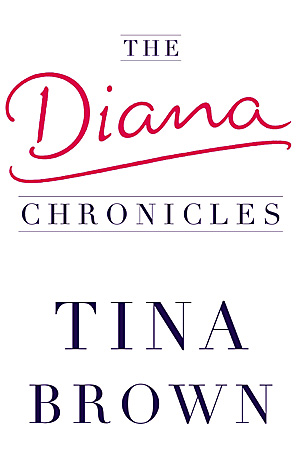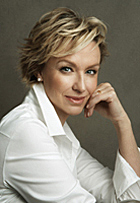
The Diana Chronicles
by Tina Brown
 Kids,
let me tell you about my lunch with my new best girlfriend, Tina Brown.
You mean I never told you that the former editor of The New Yorker
magazine and I were best pals? Well, don’t feel bad, I don’t think she
knows, either, but I reckon I can be easily forgiven for mistaking our
acquaintance after reading her latest book, The Diana Chronicles. Once
you’ve read Brown’s fabulous and juicy biography of Princess Diana,
you’ll swear you’ve just sat down to a Cobb salad, martini, and a
healthy side of Goss with the authoress herself.
Kids,
let me tell you about my lunch with my new best girlfriend, Tina Brown.
You mean I never told you that the former editor of The New Yorker
magazine and I were best pals? Well, don’t feel bad, I don’t think she
knows, either, but I reckon I can be easily forgiven for mistaking our
acquaintance after reading her latest book, The Diana Chronicles. Once
you’ve read Brown’s fabulous and juicy biography of Princess Diana,
you’ll swear you’ve just sat down to a Cobb salad, martini, and a
healthy side of Goss with the authoress herself.
What separates The Diana Chronicles from the billions of other bios
about the Princess is the amount of insider information Brown has access
to owing to her glamourous position as a doyenne of the world of glossy
magazines. What makes it stand out is Brown’s willingness to include the
reader in that access without ever being the least bit superior about
it: You understand that Brown traveled in the same circles as Diana when
she mentions early on in the book about having had lunch with the
Princess and Vogue editor Anna Wintour a month before her death in 1997,
and this is only related to point out the changes Brown perceived in
Diana from the time she first met the Princess back in 1981.The reader
never feels high-hatted or that what they’re reading occurs in some
frosty pink society bubble far out of reach. On the contrary, one of the
most enjoyable aspects was Tina Brown’s almost nihilistic rending of
British high-society walls of secrets, built to keep the little people
from knowing its clannish ways and means. Brown is more than generous
with the privilege she’s been given and it’s the reader who benefits;
not only are we given an unparalleled peek into a way of life few of us
will ever infiltrate, but we are also given a clearer light into her
subject’s world and an understanding of the realities of that existence.
Brown is no starstruck butler, or tabloid journo gone lucky once; this
biography is the real thing, a clever, thoughtfully constructed
studiously researched impression of the life of a nice young girl who
happened to end up wife of the heir to the throne of the British Empire.
The other factor that makes The Diana Chronicles so singular is the very
voice Brown gives her book. It’s personal, chatty and loaded with
elegant, earthy wit. Her take on the first Royal PR casualty, Princess
Margaret, and the effect the press had in exposing her extramarital
affair:
“Actually, Roddy {Llewellyn} was a sweet, affectionate, slightly
hopeless aging hippie, a talented landscape gardener who offered
kindness to Margaret at a time when her husband, Lord Snowdon, was
largely indifferent to her. Her press narrative, however, was already
sealed: she was irresponsible, flashy and worse a serial escapee of
English weather.”
Not the wicked prattle of a fishwife, nor the sensationalism of a Fleet
Street tabloidist, but when Brown chides the acts and motivations of the
various players in her story (“No single factor shaped the divorce of
the Prince and Princess of Wales more than the decisions they made to
involve the media.”), then if you didn’t feel like you were lunching at
Le Cirque with Brown, then the two of you were certainly chatting away
while hanging up the laundry in your respective backyards. There’s a
personable, everywoman warmth to Brown’s narrative; despite the
abundance of evidence she provides for the conclusions and opinions she
reaches, that warmth also serves to keep simmering scenarios that might
read as twice-tread old hat in hands of lesser Dianalogists. Her
observations are perceptive and refreshing. When discussing Diana’s
other unrequited love, Muslim doctor Hasnat Khan, whose family would
never accept the Princess as his bride, Brown notes,
“This time the situation was doomed, but for a novel reason. With the
Windsors, she was suitable, but not desired. With the Khans, she was
desired, but not suitable.”
On the crash that killed Diana and her boyfriend, Harrod’s heir, Dodi Al
Fayed, Brown provides her take on Al Fayed’s father, Mohamed’s cries of
conspiracy in the death of his son:
“Mohamed Al Fayed’s mourning was incendiary. The need to appoint a
culprit became a lifetime’s unholy war. Like everybody else, his public
relations executive…initially pinned blame on the paparazzi – “Gallic
kamikaze, a load of disgusting creeps” – and described {driver} Henri
Paul as a “sober, model employee” who was perfectly qualified to drive
the Mercedes as a chauffeur. If Paul was none of the above, then Mohamed
Al Fayed himself risked having to share in the legal as well as the
moral responsibility for the deaths of Dodi and Diana, Henri Paul was Al
Fayed’s employee from Al Fayed’s hotel, driving a car arranged by Al
Fayed’s people. It was an agonising prospect for a grieving father, and
on top of the unbearable pain there had to be the fear that he would be
blamed for taking the adored Princess from them.”
“Sparing no expense, treating no reputation as inviolate, Mohamed Al
Fayed’s well-financed PR machine created nothing less than an alternate
universe in which fantasy was fact, doubt was certainty, suspicion was
conviction, absence of evidence was proof of its suppression, and anyone
skeptical of the plot was either part of it, or – in his words – an
“arse licker.”
Brown debunks the crash conspiracy. She refutes or disproves a good
number of popular Diana-era mythology like just how soon into Charles
and Diana’s marriage did Charles restart his affair with Camilla
Parker-Bowles? How exactly were the infamous Squidgygate and the
regrettable ‘Prince Charles imagines himself as a feminine hygiene
product’ recordings leaked? Did Diana throw herself down the stairs
while pregnant with Prince William in a suicide attempt? It’s all about
access, folks, and Brown lets us in on hers. It’s worthy saying that
while Brown does wag her finger at the tabloids and paparazzi for
stalking Diana mercilessly, she’s not hypocritical about it. Brown was a
journalist, who, like every other editor in Britain saw her circulation
rise with a juicy Diana tidbit and Brown is very upfront and even makes
some straightforward mea culpas though not in a maudlin or ingratiating
way. While you can see her sympathies are understandably pro-Diana, this
is no love letter. Brown isn’t blind to her faults. Discussing both
Charles and Diana’s ardent desire for approval from the Queen for their
benevolent and diplomatic efforts, and their disillusionment when none
was forthcoming, Brown relates to us the wisdom behind the fact that
other maligned members of the Royal family do their charitable deeds
purposely unreported.
“Prince Philip has done good works and fund-raising and doesn’t expect
people to appreciate him. This yields him the benefit of not having to
appreciate people in return, which is probably the right course.”
In Brown’s view, Diana was an inexperienced girl whose popular phenomena
was at first only the means to gain love and approbation from the
husband and new family the 20-year-old bride adored. It was only with
the deterioration of the marriage that the young girl took her comfort
in the one place where she was always adored, the public eye, and Brown
lets that public see just how expert Diana became at keeping it firmly
trained on herself. Tina Brown’s portrait of Diana is the fullest, most
complete and rounded one I’ve yet read. Unlike other biographies’
tendency to buy into the easily accepted (- and sold) façade of Diana as
a helpless, hopeless, friendless creature victimised on all sides, Brown
captures her pathos without allowing Diana or the reader to wallow in
it, and shows us that while Diana had her troubles, many of them were
the result of self-sabotage. Let’s face it, she may have been a
Princess, but she was a Queen when it came to Drama. Brown brings a
welcome balance to that unstable picture. Brown reveals Diana’s wicked
sense of humour, her keen natural intelligence and sharp instincts, her
cultivation of loyal friends, her truly good and brave acts for those in
need, the adoration of her boys and her joys and disillusionments as a
flesh and blood woman. Brown’s Diana is so vivid and intimate it makes
one pine for the loss what this fascinating, very public figure might
have become.
So dears, simply put, The Diana Chronicles is one of the most
deliciously readable biographies I’ve got on the Temple bookshelf.
Possibly the best story of a life I’ve ever read, and all due to the
wise and witty voice of Tina Brown, who tells Diana’s tale with grace,
style, and down to earth common-sensibility. I was involved and enrapt
from the opening quote. I enjoyed every comma and quotation mark and
can’t wait to nosh at Nobu with my good friend Tina again.
~ Mighty Ganesha
Feb 26th, 2008
© 2006-2022 The Diva Review.com
|
